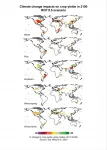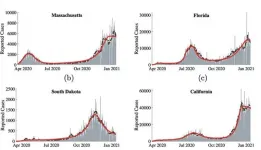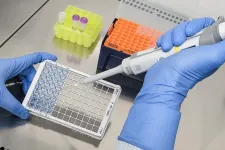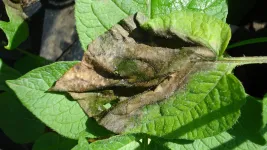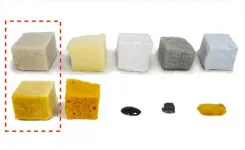(Press-News.org) Shifts in weather patterns induced by climate change will increase extreme heat and reduce rainfall across major crop growing regions, with impacts on agricultural production. Will this trigger a decline in the supply of calories needed to sustain the world's growing population?
According to a study published in the Journal of Environmental Economics and Management, global calorie supplies are subject to continuing or even increasing vulnerability to climate change. Climate change could reduce global crop yields by 10% by mid-century and 25% by century's end, under a vigorous warming scenario, if farmers cannot adapt better than they did historically.
To quantify this, a team of researchers from Boston University, Ca' Foscari University of Venice and the Euro-Mediterranean Center on Climate Change Foundation (CMCC) coupled their statistical models trained on past data with forecasts of future temperature and rainfall from 21 high-resolution Global Climate Models (GCMs) simulations to project how yields might change in response to shifting weather patterns.
"Globally, farmers' capacity to adapt to climate change impacts, even over longer periods, might be limited - Professor Ian Sue Wing from Boston University and lead author of the study explains - Even in the United States, the world's agricultural technology frontier, farmers have been able to only slightly compensate for the adverse impacts of extreme heat on yields of maize and soybeans over time-frames of decades".
Enrica De Cian, professor at Ca' Foscari University and researcher at CMCC adds: "We asked ourselves: If difficulties to adapt are observed in the US, what can we then expect for food producers in the tropics, where 40% of the world's population live and high temperatures extremes are projected to rise more than in the major calorie crop growing regions of the US?
The study sheds new light on this question. The authors analyze the worldwide vulnerability of four crops (maize, rice, soybean and wheat), responsible for 75% of global calorie intake, to future shifts in temperature and rainfall patterns caused by climate change.
"We used statistical models trained on large global gridded datasets of historical crop yields, temperature and rainfall, to separate changes in yield responses to heat and moisture exposure over their crop-specific growing seasons into two types of adaptation - Malcolm Mistry, postdoc at Ca' Foscari University of Venice and a research affiliate at CMCC, explains - On one hand, farmers' short run response to unanticipated weather shocks, and, on the other hand, long run adjustments over decades".
While farmers have limited options to adjust to weather changes in the short run--for example, by changing the quantity of fertilizer or irrigation water applied to their crop - over long time-frames it is possible for them to undertake substantial adaptation by changing in crop varieties, shifting planting and harvesting dates, adopting new farming technologies, and investing in more or different agricultural machinery. In principle, long-run adjustments have the potential to compensate for the effects of adverse weather on yields.
The question posed by the research is: did farmers actually fulfill that potential?
"Surprisingly, at the global scale and in most world regions, the answer is no - Professor Enrica De Cian states - Our results showed that adverse impacts of extreme hot or dry days on the productivity of the crops from which we derive food calories persisted over decades, in line with the earlier findings for the US. Worse, these negative long-run effects were sometimes larger than the impacts on yield that occurred due to transitory weather shocks".
"The implication is that global calorie supplies are subject to continuing or even increasing vulnerability to climate change - Professor Ian Sue Wing concludes -. Now, we plan to build on these findings to investigate how irrigation investments and shifting cultivation over space can help offset the impacts of adverse climatic changes".
INFORMATION:
The study in the Journal of Environmental Economics and Management can be found here, and was published with financial support from the United States Department of Energy and from the People Programme (Marie Curie Actions) of the European Union's Seventh Framework Programme (FP7/2007-2013).
References:
Sue Wing, I., De Cian E. and Mistry, M.N., 2021: Global vulnerability of crop yields to climate change, Journal of Environmental Economics and Management (JEEM), 102462, https://doi.org/10.1016/j.jeem.2021.102462.
Every day, around 15 000 children under the age of five die from causes that could have been prevented.
But the children of highly educated parents survive more often than others. This statistic applies worldwide, according to a newly published sweeping systematic review in The Lancet.
The mother's level of education is particularly important for her children's survival.
"One year of extra education for the mother is associated with an approximately three per cent reduction in mortality on average," says Professor Terje Andreas Eikemo at the Norwegian University of Science ...
PROVIDENCE, R.I. [Brown University] -- By adding behavioral components to an infectious disease model, Brown University researchers have developed a new modeling approach that captures the peaks and valleys in new COVID-19 cases seen over the past 16 months.
The approach, published in the journal Scientific Reports, could be useful in forecasting the future trends in the current pandemic, as well as in predicting the course of future ones.
"We know that people's behavior matters in terms of how an infection is spread," said Vikas Srivastava, an assistant professor of ...
Tsukuba, Japan - To study the immune system in human health and disease, scientists commonly use the genetic manipulation of mouse hematopoietic stem and progenitor cells (HSPCs) as a powerful model system. These studies have been extremely valuable in the fight against a number of human diseases. However, the current procedures are complex, time-consuming, and expensive.
In a new study published in NATURE COMMUNICATIONS, researchers at the University of Tsukuba have developed a novel technique that has the potential to overcome the limitations associated with these models, which are known as bone marrow (BM) chimeric mice. This system allows scientists to observe and investigate how ...
SARS-CoV-2 outbreaks involving care homes with fully vaccinated residents have been reported across Germany. In order to gain a better understanding of this phenomenon, a team of researchers from Charité - Universitätsmedizin Berlin used an outbreak at a Berlin-based facility to analyze virus-related data and study the immune responses of elderly residents following vaccination. The researchers' data, which have been published in Emerging Infectious Diseases*, confirm vaccine effectiveness in the elderly. However, they also indicate a delayed and slightly reduced immune response. In light of their findings, the researchers emphasize the need to vaccinate both caregivers and close contacts in order to better protect this high-risk group.
The BioNTech/Pfizer ...
Research combining systematic observations with cosmological simulations has found that, surprisingly, black holes can help certain galaxies form new stars. On scales of galaxies, the role of supermassive black holes for star formation had previously been seen as destructive - active black holes can strip galaxies of the gas that galaxies need to form new stars. The new results, published in the journal Nature, showcase situations where active black holes can, instead, "clear the way" for galaxies that orbit inside galaxy groups or clusters, keeping those galaxies from having their star formation disrupted as they fly through the surrounding intergalactic gas.
Active black holes are primarily thought to have a destructive influence on their surroundings. As they blast ...
At a classical second-order phase transition, condensed matter systems acquire long-range order upon cooling below the transition temperature, and the properties near the transition are driven by thermal fluctuations. These behaviors have been long explained by the Landau theory of phase transitions, which leads to the notion of universality, whereby systems with very different microscopic constituents exhibit certain universal macroscopic behaviors close to a phase transition. Some condensed matter systems however can be tuned so that the phase transition is suppressed to zero temperature at a quantum critical point (QCP), where the behaviors are no longer driven by thermal fluctuations, but by quantum fluctuations arising as a consequence of Heisenberg's uncertainty principle.
Heavy ...
North Carolina State University researchers continue to track the evolution of different strains of the plant pathogen that caused the Irish potato famine in the 1840s, which set down roots in the United States before attacking Europe.
NC State plant pathologists studied the genomes of about 140 pathogen samples - historic and modern - from 37 countries on six continents to track the evolution of differing strains of Phytophthora infestans, a major cause of late-blight disease on potato and tomato plants.
The study, published in Scientific Reports, shows that the historic lineage called FAM-1 was found in ...
Human papillomavirus (HPV) vaccines applied in national vaccination programs protect against most cancers associated with oncogenic, high-risk (hr) HPV types. Two recent studies demonstrate the impact of gender-neutral HPV vaccination in the overall protection against hrHPV infections already with low vaccination coverage.
More than 30 000 12-15-year-old Finnish girls and boys participated in a community-randomized trial that evaluated the impact of gender-neutral vs. girls-only HPV16/18 vaccination in the two school years of 2007-2008 and 2008-2009 in 33 communities. To evaluate the occurrence of HPV infections, pre- and post-vaccination serum samples collected in the same communities were used to measure the antibodies against ...
A new high-performance plastic foam developed from whey proteins can withstand extreme heat better than many common thermoplastics made from petroleum. A research team in Sweden reports that the material, which may be used for example in catalysts for cars, fuel filters or packaging foam, actually improves its mechanical performance after days of exposure to high temperatures.
Reporting in Advanced Sustainable Systems, researchers from KTH Royal Institute of Technology in Stockholm say the research opens the door to using protein-based foam materials in potentially tough environments, such as filtration, ...
WESTMINSTER, Colorado - June 06, 2021 - Many invasive plants are expanding their growing range in response to climate change, making early detection and rapid response more critical than ever. Limited resources, though, can make it impossible to track and manage every range-shifting species.
To help invasive species managers bring focus their efforts, a team from the University of Massachusetts suggests prioritizing potential invaders based on the threat they represent.
In a research project featured in the journal Invasive Plant Science and Management, the team explored data on 87 plant species that are projected ...
